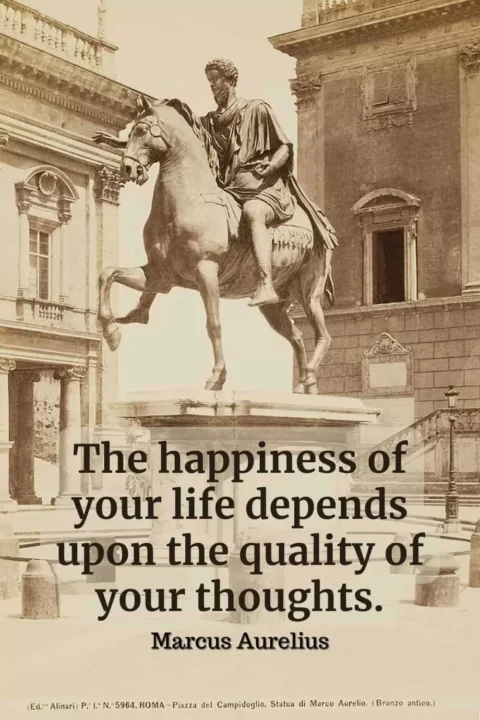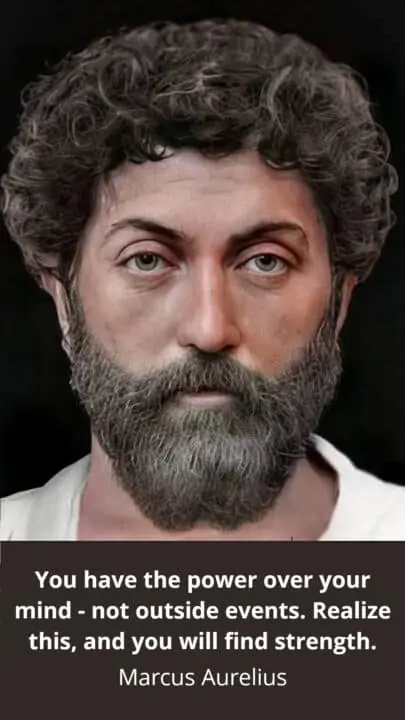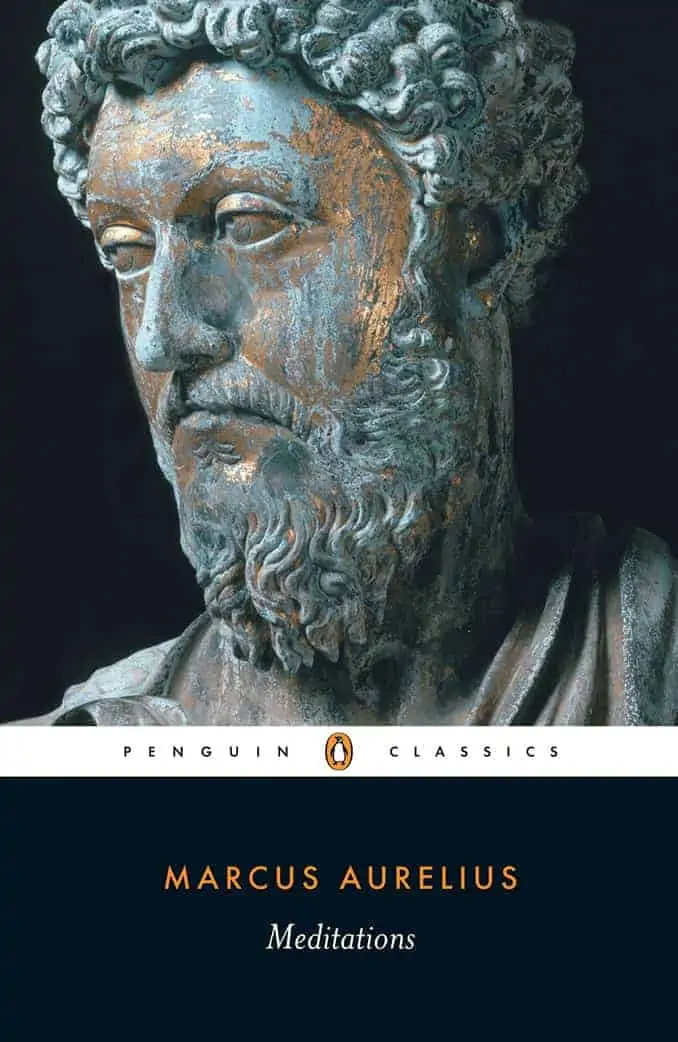Marcus Aurelius was the most powerful man on earth for 20 years during his reign from 161 to 180 CE.
He was The Last Good Roman Emperor, and for many people, he was the greatest king ever. Marcus was also the last great Stoic of antiquity.
Read the last words of Marcus Aurelius, The Philosopher King.
These quotes here reflect his philosophical beliefs and offer us insights into his thoughts on philosophy, happiness, and commitment in a turbulent life.
Many of these quotes have become well-known and are still widely quoted and admired today. Marcus Aurelius’ work, Meditations, continues to inspire and influence people seeking wisdom and guidance in their daily lives today.

100 Marcus Aurelius Quotes On Life
Here are 100 immortal quotes on living a fearless life by Marcus Aurelius:
You may leave this life at any moment: have this possibility in your mind in all that you do or say or think.
— Meditations. 2.11 (Hammond trans.)

Remove the judgement, and you have removed the thought ‘I am hurt’: remove the thought ‘I am hurt’, and the hurt itself is removed.
— Meditations. 4.7 (Hammond trans.)

Love the art which you have learnt, and take comfort in it.
— Meditations. 4.31 (Hammond trans.)

Your mind will take on the character of your most frequent thoughts: souls are dyed by thoughts. So dye your own
— Meditations. 5.16 (Hammond trans.)

The best revenge is not to be like your enemy.
— Meditations. 6.6 (Hammond trans.)

Soon you will have forgotten all things: soon all things will have forgotten you.
— Meditations. 7.21 (Hammond trans.)

Perfection of character is this: to live each day as if it were your last, without frenzy, without apathy, without pretence.
— Meditations. 7.69 (Hammond trans.)

Men are born for the sake of each other. So either teach or tolerate.
— Meditations. 8.59 (Hammond trans.)

Today I escaped from all bothering circumstances—or rather I threw them out. They were nothing external, but inside me, just my own judgements.
— Meditations. 9.13 (Hammond trans.)
All that you see will soon perish; those who witness this perishing will soon perish themselves. Die in extreme old age or die before your time — it will all be the same.
— Meditations. 9.33 (Hammond trans.)
No more roundabout discussion of what makes good man. Be one!
— Meditations. 10.16 (Hammond trans.)
You should leave another’s wrong where it lies.
— Meditations. 9.20 (Hammond trans.)
When you wake up in the morning, tell yourself: The people I deal with today will be meddling, ungrateful, arrogant, dishonest, jealous, and surly. They are like this because they can’t tell good from evil. But I have seen the beauty of good, and the ugliness of evil, and have recognized that the wrongdoer has a nature related to my own… And so none of them can hurt me.
— Marcus Aurelius, Meditations. 2.1 (Gregory Hays trans.)
Your ability to control your thoughts—treat it with respect. It’s all that protects your mind from false perceptions—false to your nature, and that of all rational beings.
— Meditations. 3.9 (Hays trans.)
Choose not to be harmed—and you won’t feel harmed. Don’t feel harmed—and you haven’t been.
— Meditations. 4.7 (Hays trans.)
Many lumps of incense on the same altar. One crumbles now, one later, but it makes no difference.
— Meditations. 4.15 (Hays trans.)
Not to live as if you had endless years ahead of you. Death overshadows you. While you’re alive and able—be good.
— Meditations. 4.17 (Hays trans.)
Time is a river, a violent current of events, glimpsed once and already carried past us, and another follows and is gone.
— Meditations. 4.43 (Hays trans.)
You could leave life right now. Let that determine what you do and say and think.
— Meditations. 2.11 (Hays trans.)
No one can lose either the past or the future — how could anyone be deprived of what he does not possess?
— Meditations. 2.14 (Hammond trans.)
Do not waste the remaining part of your life in thoughts about other people, when you are not thinking with reference to some aspect of the common good.
— Meditations. 3.4 (Hammond trans.)
When someone does you wrong, do not judge things as he to them or would like you to interpret them. Just see them as they are, in plain truth.
— Meditations. 4.11 (Hammond trans.)
No, you do not have thousands of years to live. Urgency is on you. While you live, while you can, become good.
— Meditations. 4.17 (Hammond trans.)
Another does wrong. What is that to me? Let him see to it: he has his own disposition, his own action.
— Meditations. 5.25 (Hammond trans.)
Remember how long you have been putting this off, how many times you have been given a period of grace by the gods and not used it. It is high time now for you to understand … if you do not use it to clear away your clouds, it will be gone, and you will be gone, and the opportunity will not return.
— Marcus Aurelius, Meditations. 2.4 (Martin Hammond trans.)
The praise of the many, or power, or wealth, or the enjoyment of pleasure. All these things may seem to suit for a little while, but they can suddenly take control and carry you away. So you, I repeat, must simply and freely choose the better and hold to it.
— Meditations. 3.6.3 (Hammond trans.)
Failure to read what is happening in another’s soul is not easily seen as a cause of unhappiness: but those who fail to attend to the motions of their own soul are necessarily unhappy.
— Meditations. 2.8 (Hammond trans.)
No action should be undertaken without aim, or other than in conformity with a principle affirming the art of life.
— Meditations. 4.2 (Hammond trans.)
Change: nothing inherently bad in the process, nothing inherently good in the result.
— Meditations. 4.42 (Hammond trans.)
To pursue the impossible is madness: and it is impossible for bad men not to act in character.
— Meditations. 5.17 (Hammond trans.)
So one should pass through this tiny fragment of time in tune with nature, and leave it gladly, as an olive might fall when ripe, blessing the earth which bore it and grateful to the tree which gave it growth.
— Meditations. 4.48 (Hammond trans.)
‘It is my bad luck that this has happened to me.’ No, you should rather say: ‘It is my good luck that, although this has happened to me, I can bear it without pain, neither crushed by the present nor fearful of the future.’
— Meditations. 4.49 (Hammond trans.)
At break of day, when you are reluctant to get up, have this thought ready to mind: ‘I am getting up for a man’s work. Do I still then resent it, if I am going out to do what I was born for, the purpose for which I was brought into the world? Or was I created to wrap myself in blankets and keep warm?’ ‘But this is more pleasant.’ Were you then born for pleasure — all for feeling, not for action?
— Meditations. 5.1 (Hammond trans.)
They cannot admire you for intellect. Granted — but there are many other qualities of which you cannot say, ‘but that is not the way I am made’. So display those virtues which are wholly in your own power — integrity, dignity, hard work, self-denial, contentment, frugality, kindness, independence, simplicity, discretion, magnanimity. Do you not see how many virtues you can already display without any excuse of lack of talent or aptitude? And yet you are still content to lag behind.
— Meditations. 5.5 (Hammond trans.)
These can impede some activity, yes, but they form no impediments to my impulse or my disposition, because here there is conditional commitment and the power of adaptation. The mind adapts and turns round any obstacle to action to serve its objective: a hindrance to a given work is turned to its furtherance, an obstacle in a given path becomes an advance.
— Meditations. 5.20 (Hammond trans.)
‘There was a time when I met luck at every turn.’ But luck is the good fortune you determine for yourself: and good fortune consists in good inclinations of the soul, good impulses, good actions.
— Meditations. 5.37 (Hammond trans.)
If someone can prove me wrong and show me my mistake in any thought or action, I shall gladly change. I seek the truth, which never harmed anyone: the harm is to persist in one’s own self-deception and ignorance.
— Meditations. 6.21 (Hammond trans.)
Sober up, recall yourself, shake off sleep once more: realize they were mere dreams that troubled you, and now that you are awake again look on these things as you would have looked on a dream.
— Meditations. 6.31 (Hammond trans.)
How to understand your own good: the lover of glory takes it to be the reactions of others; the lover of pleasure takes it to be his own passive experience; the intelligent man sees it as his own action.
— Meditations. 6.51 (Hammond trans.)
Do not let the future trouble you. You will come to it (if that is what you must) possessed of the same reason that you apply now to the present.
— Meditations. 7.8 (Hammond trans.)
Whatever anyone does or says, I must be a good man. It is as if an emerald, or gold or purple, were always saying: ‘Whatever anyone does or says, I must be an emerald and keep my own colour.’
— Meditations. 7.15 (Hammond trans.)
When someone does you some wrong, you should consider immediately what judgement of good or evil led him to wrong you. When you see this, you will pity him, and not feel surprise or anger. — Meditations. 7.26 (Hammond trans.)
Do not dream of possession of what you do not have: rather reflect on the greatest blessings in what you do have, and on their account remind yourself how much they would have been missed if they were not there.
— Meditations. 7.27 (Hammond trans.)
Whenever you want to cheer yourself, think of the qualities of your fellows — the energy of one, for example, the decency of another, the generosity of a third, some other merit in a fourth. There is nothing so cheering as the stamp of virtues manifest in the character of colleagues — and the greater the collective incidence, the better. So keep them ready to hand.
— Meditations. 6.48 (Hammond trans.)
Love only what falls your way and is fated for you. What could suit you more than that? — Meditations. 7.57 (Hammond trans.)
Dig inside yourself. Inside there is a spring of goodness ready to gush at any moment, if you keep digging.
— Meditations. 7.59 (Hammond trans.)
Take care that you never treat the misanthropic as they treat mankind.
— Meditations. 7.65 (Hammond trans.)
Not possible to study. But possible to rein in arrogance; possible to triumph over pleasures and pains; possible to rise above mere glory; possible not to be angry with the unfeeling and the ungrateful, and even, yes, to care for them.
— Meditations. 8.8 (Hammond trans.)
Whenever you meet someone, ask yourself first this immediate question: ‘What beliefs does this person hold about the good and bad in life?’
— Meditations. 8.14 (Hammond trans.)
Man’s joy is to do man’s proper work. And work proper to man is benevolence to his own kind, disdain for the stirrings of the senses, diagnosis of the impressions he can trust, contemplation of universal nature and all things thereby entailed.
— Meditations. 8.26 (Hammond trans.)
You must compose your life action by action, and be satisfied if each action achieves its own end as best can be: and no one can prevent you from that achievement.
— Meditations. 8.32 (Hammond trans.)
Accept humbly: let go easily.
— Meditations. 8.33 (Hammond trans.)
I have no cause to hurt myself: I have never consciously hurt anyone else.
— Meditations. 8.42 (Hammond trans.)
A bitter cucumber? Throw it away. Brambles in the path? Go round them. That is all you need, without going on to ask, ‘So why are these things in the world anyway?’
— Meditations. 8.50 (Hammond trans.)
Allow some leisure in your life.
— Meditations. 8.51 (Hammond trans.)
If you can, show them the better way. If you cannot, remember that this is why you have the gift of kindness. The gods too are kind to such people, and in their benevolence even help them achieve some ends — health, wealth, fame.
— Meditations. 9.11 (Hammond trans.)
Practice the virtues you can show: honesty, gravity, endurance, austerity, resignation, abstinence, patience, sincerity, moderation, seriousness, high-mindedness. Don’t you see how much you have to offer—beyond excuses like “can’t”? And yet you still settle for less.
— Meditations. 5.5 (Hays trans.)
Even if you’re going to live three thousand more years, or ten times that, remember: you cannot lose another life than the one you’re living now, or live another one than the one you’re losing. The longest amounts to the same as the shortest. The present is the same for everyone; its loss is the same for everyone; and it should be clear that a brief instant is all that is lost. For you can’t lose either the past or the future; how could you lose what you don’t have?
— Meditations. 2.14 (Hays trans.)
All of them might seem to be compatible with it—for a while. But suddenly they control us and sweep us away. So make your choice straightforwardly, once and for all, and stick to it. Choose what’s best. Best is what benefits me. As a rational being? Then follow through. Or just as an animal? Then say so and stand your ground without making a show of it. (Just make sure you’ve done your homework first.)
— Meditations. 3.6 (Hays trans.)
Our actions may be impeded by them, but there can be no impeding our intentions or our dispositions. Because we can accommodate and adapt. The mind adapts and converts to its own purposes the obstacle to our acting. The impediment to action advances action. What stands in the way becomes the way.
— Meditations. 5.20 (Hays trans.)
So other people hurt me? That’s their problem. Their character and actions are not mine. What is done to me is ordained by nature, what I do by my own.
— Meditations. 5.25 (Hays trans.)
If anyone can refute me—show me I’m making a mistake or looking at things from the wrong perspective—I’ll gladly change. It’s the truth I’m after, and the truth never harmed anyone. What harms us is to persist in self-deceit and ignorance.
— Meditations. 6.21 (Hays trans.)
Nothing has meaning to my mind except its own actions. Which are within its own control. And it’s only the immediate ones that matter. Its past and future actions too are meaningless.
— Meditations. 6.32 (Hays trans.)
When you need encouragement, think of the qualities the people around you have: this one’s energy, that one’s modesty, another’s generosity, and so on. Nothing is as encouraging as when virtues are visibly embodied in the people around us, when we’re practically showered with them. It’s good to keep this in mind.
— Meditations. 6.48 (Hays trans.)
It is crazy to want what is impossible. And impossible for the wicked not to do so.
— Meditations. 5.17 (Hays trans.)
Forget the future. When and if it comes, you’ll have the same resources to draw on—the same logos.
— Meditations. 7.8 (Hays trans.)
No matter what anyone says or does, my task is to be good. Like gold or emerald or purple repeating to itself, “No matter what anyone says or does, my task is to be emerald, my color undiminished.”
— Meditations. 7.15 (Hays trans.)
Treat what you don’t have as nonexistent. Look at what you have, the things you value most, and think of how much you’d crave them if you didn’t have them. But be careful. Don’t feel such satisfaction that you start to overvalue them—that it would upset you to lose them.
— Meditations. 7.27 (Hays trans.)
Think of yourself as dead. You have lived your life. Now take what’s left and live it properly.
— Meditations. 7.56 (Hays trans.)
The first step: Don’t be anxious. Nature controls it all. And before long you’ll be no one, nowhere—like Hadrian, like Augustus. The second step: Concentrate on what you have to do. Fix your eyes on it. Remind yourself that your task is to be a good human being; remind yourself what nature demands of people. Then do it, without hesitation, and speak the truth as you see it. But with kindness. With humility. Without hypocrisy.
— Meditations. 8.5 (Hays trans.)
When you have trouble getting out of bed in the morning, remember that your defining characteristic—what defines a human being—is to work with others. Even animals know how to sleep. And it’s the characteristic activity that’s the more natural one—more innate and more satisfying.
— Meditations. 8.12 (Hays trans.)
You have to assemble your life yourself—action by action. And be satisfied if each one achieves its goal, as far as it5 can. No one can keep that from happening.
— Meditations. 8.32 (Hays trans.)
Don’t let your imagination be crushed by life as a whole. Don’t try to picture everything bad that could possibly happen. Stick with the situation at hand, and ask, “Why is this so unbearable? Why can’t I endure it?” You’ll be embarrassed to answer. Then remind yourself that past and future have no power over you. Only the present—and even that can be minimized. Just mark o its limits. And if your mind tries to claim that it can’t hold out against that … well, then, heap shame upon it.
— Meditations. 8.36 (Hays trans.)
Stop talking about what the good man is like, and just be one.
— Meditations. 10.16 (Hays trans.)
“Very little is needed to make a happy life; it is all within yourself, in your way of thinking.”
— Meditations 7.67
“You could leave life right now. Let that determine what you do and say and think.”
— Meditations 2.11
“Waste no more time arguing about what a good man should be. Be one.”
— Meditations 10.16
“The best revenge is to be unlike him who performed the injury.”
— Meditations 6.6
“If it is not right, do not do it; if it is not true, do not say it.”
— Meditations 12.17
“The soul becomes dyed with the color of its thoughts.”
— Meditations 5.16
Popular Marcus Aurelius Quotes (Not Said By Him?)
After all those Marcus Aurelius Meditations quotes, here are some memorable quotes attributed to Marcus, but are not his:
God did not intend my happiness to rest with someone else.

Be tolerant with others and strict with yourself.
If it is not right do not do it; if it is not true do not say it.
The universe is change; our life is what our thoughts make it.
Waste no more time arguing about what a good man should be. Be one.
It is not death that a man should fear, but he should fear never beginning to live.
Very little is needed to make a happy life; it is all within yourself, in your way of thinking.
It’s all in how you perceive it. You’re in control. You can dispense with misperception at will, like rounding the point.
When you arise in the morning, think of what a precious privilege it is to be alive – to breathe, to think, to enjoy, to love.
Dig deep within yourself, for there is a fountain of goodness ever ready to flow if you will keep digging.
Think of yourself as dead. You have lived your life. Now take what’s left and live it properly.
It never ceases to amaze me: we all love ourselves more than other people, but care more about their opinions than our own.
The object of life is not to be on the side of the majority, but to escape finding oneself in the ranks of the insane.
Accept the things to which fate binds you and love the people with whom fate brings you together but do so with all your heart.
Whenever you are about to find fault with someone, ask yourself the following question: What fault of mine most nearly resembles the one I am about to criticize?
If you are distressed by anything external, the pain is not due to the thing itself, but to your estimate of it; and this you have the power to revoke at any moment.
How much more grievous are the consequences of anger than the causes of it.
You shouldn’t give circumstances the power to rouse anger, for they don’t care at all.
Your mind will take the shape of what you frequently hold in thought, for the human spirit is colored by such impressions.
It’s unfortunate that this has happened. No. It’s fortunate that this has happened and I’ve remained unharmed.
Because most of what we say and do is not essential. Ask yourself at every moment, “Is this necessary?”
It’s silly to try to escape other people’s faults. They are inescapable. Just try to escape your own.
Never let the future disturb you. You will meet it, if you have to, with the same weapons of reason which today arm you against the present.
Live a good life. If there are gods and they are just, then they will not care how devout you have been, but will welcome you based on the virtues you have lived by. If there are gods, but unjust, then you should not want to worship them. If there are no gods, then you will be gone, but will have lived a noble life that will live on in the memories of your loved ones.
Death smiles at us all, but all a man can do is smile back. (It is a crowd-pleasing misquote, as Marcus never uttered those words; learn where it first appears.)
“Accept whatever comes to you woven in the pattern of your destiny, for what could more aptly fit your needs?”
“Look well into thyself; there is a source of strength which will always spring up if thou wilt always look there.”
“Do not waste what remains of your life in speculating about your neighbors, unless with a view to some mutual benefit.”
“The object of life is not to be on the side of the majority, but to escape finding oneself in the ranks of the insane.”
“The first rule is to keep an untroubled spirit. The second is to look things in the face and know them for what they are.”
“It is not death that a man should fear, but he should fear never beginning to live.”
“He who lives in harmony with himself lives in harmony with the universe.”
“The happiness of your life depends upon the quality of your thoughts.”

“The universe is change; our life is what our thoughts make it.”
“The art of living is more like wrestling than dancing.”
“A man’s worth is no greater than his ambitions.”
“The greatest wealth is to live content with little.”
“Our life is what our thoughts make it.”
What is the best advice from Marcus Aurelius?
This is perhaps the best advice and the most popular quote attributed to Marcus Aurelius:
“You have the power over your mind — not outside events. Realize this, and you will find strength.”
— Marcus Aurelius, Meditations. 7.2

The picture of Marcus Aurelius used above is a reconstruction by Alessandro Tomasi, an artist, and student of Italian and Lebanese descent, who takes the busts of famous people from antiquity and reconstructs them into incredible, lifelike images.
What Marcus wrote in Greek was:
“τὰ ἔξω τῆς ἐμῆς διανοίας οὐδὲν ὅλως πρὸς τὴν ἐμὴν διάνοιαν. τοῦτο μάθε καὶ ὀρθὸς εἶ.” (Meditations. 7.2)
Four major authors have translated that sentence as follows:
“The things which are external to my mind have no relation at all to my mind.—Let this be the state of thy affects, and thou standest erect.”
— George Long’s translation
“Things outside my understanding are nothing at all in regard to my understanding. Master this, and you stand upright.”
— Arthur Farquharson’s translation
“Things that lie outside my intellect have no hold whatever over my intellect. Learn this and you are well set up.”
— Robin Hard’s translation
“What is outside my mind means nothing to it. Absorb that lesson and your feet stand firm”.
— Gregory Hays’ translation
Why are Marcus Aurelius’ Quotes so popular?
Marcus Aurelius’ quotes have remained popular throughout the centuries because of the timeless wisdom they offer. They provide a guide for living a fulfilling life that is relevant to people from all walks of life.
These quotes also have a deep philosophical underpinning that has resonated with people for centuries. The Stoic philosophy of Marcus Aurelius emphasized self-control, resilience, and personal responsibility. These values are as relevant today as they were in ancient Rome.
What are some strange facts about Marcus Aurelius’ Meditations?
1. Marcus Aurelius wrote a journal for the last twenty years of his life. It did not have a clear literary structure, as Marcus wrote it as personal instructions for himself.
2. He never intended to publish his work. Nonetheless, it was published almost 14 centuries later.
3. When Marcus Aurelius died in 180 CE, his literary legacy “Meditations” was moved into secret custody by people unknown. Even his children were unaware of its presence.
4. In the mid-3rd century, the historian Herodian mentions “Meditations” for the first time in his History of the Empire from the Death of Marcus.
5. The first direct mention comes from Arethas of Caesarea (860–935 CE), a bishop and a manuscripts collector.
6. The first print, named the Codex Palatinus, was published in 1558 CE by Wilhelm Xylander, which is lost. Xylander had received a codex from the doctor and poet Michael Toxites. When the first copy came out, it was in Greek, the original language in which Marcus wrote it.
67 The oldest surviving print is the Codex Vaticanus in the Vatican Library since 1683 CE.
8. The first English translation came out in 1634; it carried the original title To Himself. We now know it as Meditations. Today, we have many English translations. The most famous ones are by Gregory Hays, George Long, Robin Hard, and Martin Hammond.
When it comes to his best quotes, readers have their own favorites among the many gems of wisdom offered by Marcus Aurelius.
Here are my favorites ☛ Top 10 Marcus Aurelius, Meditations quotes

Summary of Marcus Aurelius
- Marcus Aurelius was a Roman emperor who was also a philosopher and is remembered for his insightful and inspiring quotes.
- Among his many topics of interest, Marcus also wrote about love, and some of his quotes on the subject continue to be popular today.
- Marcus’ leadership skills are also a source of inspiration, and his quotes on leadership provide valuable insights for leaders in all fields.
- Quotes from Marcus Aurelius continue to be relevant and impactful today, demonstrating the timeless wisdom of his words.
- Marcus’ quotes about life cover a wide range of topics, including the importance of self-reflection and the impermanence of all things.
- “Meditations” by Marcus Aurelius is a collection of his philosophical reflections on a variety of topics, including the nature of the self and the universe.
- Some of the most famous quotes from “Meditations” are those about love, life, and death, expressing his deep understanding of the complexities of human emotion.
- Among the favorite Marcus Aurelius quotes of many readers are those that speak to the importance of living in the present moment and accepting the world as it is.
Final Words
We are fortunate to be able to read the quotes from Marcus Aurelius’ “Meditations,” one of history’s most powerful kings, as it was a book we almost lost to Time.
We are doubly fortunate because, because Marcus was not writing for an audience, and his words were as frank as if he were speaking to his mirror.
“Meditations” examines Marcus’ innermost thoughts and struggles, as well as guides him on how to live the best life possible. He wrote to better understand himself, the universe, and human life.
There will never be another book like it.
• • •
• • •
Author Bio: Written and reviewed by Sandip Roy — a medical doctor, psychology writer, and happiness researcher, who writes on mental well-being, happiness, positive psychology, and philosophy (especially Stoicism).
√ If you liked it, please spread the word.
